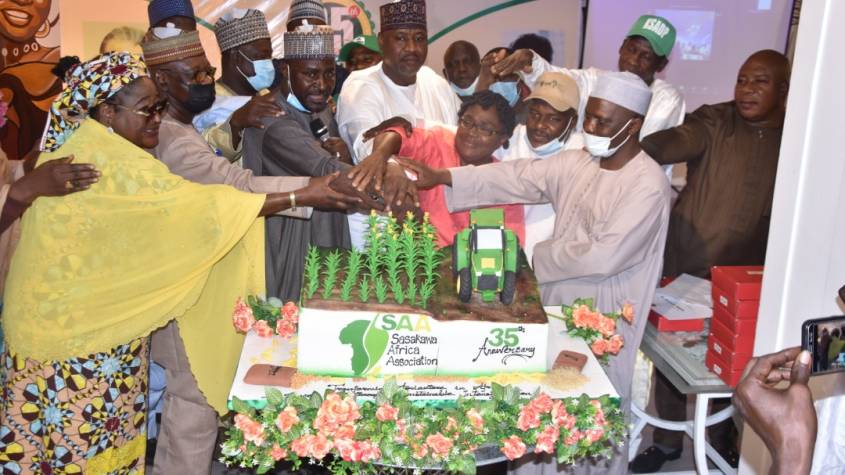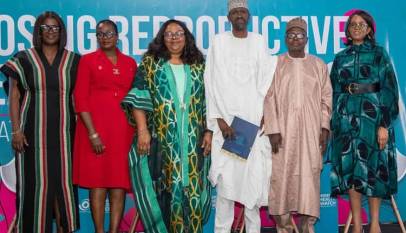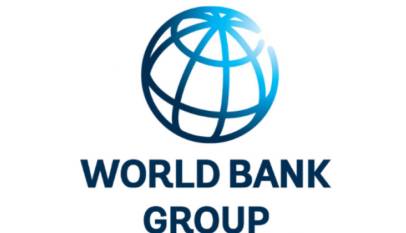Sasakawa: 35 years of empowering African smallholder farmers
Sasakawa Africa Association-Nigeria recently joined its counterparts in Ethiopia, Uganda and Mali to celebrate the nonprofit’s 35th anniversary of working to empower African smallholder farmers, in Abuja, the Nigerian capital.
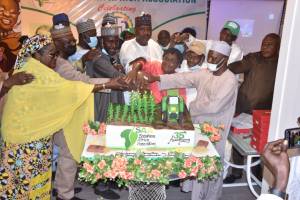
By Adam Alqali
It was in direct response to the famine ravaging parts of Africa in the 1980s that the trio of Japanese billionaire industrialist Ryoichi Sasakawa alongside Dr Norman Borlaug, the American agricultural scientist who had won the Nobel Prize for his contribution to global food security, particularly creating the Green Revolution in the Indian sub-continent, as well as former US President Jimmy Carter, established the Sasakawa Africa Association (SAA) 35 years ago to provide a sustainable solution to Africa’s food security challenge.
Hitherto known as Sasakawa Global 2000 (SG2000), SAA had since its creation in 1986, worked in collaboration with thousands of frontline extension agents (EAs) to assist millions of smallholder farmers across 16 sub Saharan African countries to leverage its enhanced technologies to transform the value-chains of several crops. SAA’s foremost goal is to build resilient and sustainable food systems across Africa, one that will guarantee a food secure continent.
SAA is currently focused on increasing farmers’ income as well as food and nutrition security through promoting market-oriented, sustainable, regenerative and nutrition-sensitive agricultural innovations, alongside building the capacity of extension agents and farmers. As per its new slogan i.e “Walking with the Farmer”, SAA says it is now committed to adopting a participatory approach that provides need based feedback to farmers and value chain actors to establish technologies and fruitful market linkages that addresses the specific concerns of farmers.
To celebrate the 35th anniversary of SAA’s work with African farmers, the Nippon Foundation-funded nonprofit had between November and December hosted special ceremonies across its core four countries of focus, namely Ethiopia, Mali, Nigeria, and Uganda. The anniversary commemoration was attended by key stakeholders in the agricultural sector across the respective countries including ministers of agriculture, farmers’ groups, research institutes and universities.
“We’ve achieved successes, made mistakes” – Yohei Sasakawa
In his video goodwill message to the anniversary commemoration in Nigeria early December, Mr Yohei Sasakawa, chairman of Nippon Foundation, said SAA’s work was being guided by Nippon Foundation’s basic philosophy of “One World, One Family” which he credited to his late father, Ryoichi Sasakawa. Accordingly, he said they had continuously provided humanitarian assistance across the boundaries of politics, religion, race, and national borders including their agricultural assistance to Africa inspired by the 1980s famine.
“We joined forces with Dr. Norman Borlaug and the former U.S. President Jimmy Carter to help smallholder farmers, who are the mainstay of agriculture in Africa. Policies were designed, implemented and carried over throughout 35 years. This has helped the smallholder farmers to gain independence and improve their standard of living. I would venture to say that we have both experienced successes as well as made many mistakes.
“The last 35 years has not been a smooth ride. We faced numerous challenges but each time, we did not try to sidestep those difficulties but faced them and overcame them. It was all for the sake of ensuring that children in Africa did not have to go to sleep hungry. We persisted and made the effort to take it to the farmers. This spirit of never giving up has made SAA an indispensable organization in Africa,” he reiterated.
Mr Sasakawa therefore called on stakeholders in African agriculture to continue to provide their unalloyed support to SAA so as to safeguard the future of agriculture in Africa. “If we can join forces and work together, we can make the lives of people in Africa more prosperous and bring about a more hopeful Africa,” he concluded.
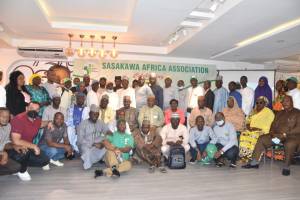
“We’ve quadrupled yields of millions of smallholder farmers – Ruth Oniang’o
Prof Ruth Oniang’o, the renowned Kenyan professor of nutrition cum chairperson of SAA’s board of directors, in her remarks said SAA’s interventions around the continent had successfully quadrupled the yields of millions of smallholder farmers in rural Africa, noting that women and children’s health and nutrition were now at the core of SAA’s work.
“We have a new strategy which merges the work of both SAA and SAA Fund for Extension education (SAFE) and that strategy is in recognition of the fact that we also needed academic expertise in running programs. This is why we partner with universities across the 11 countries where we currently run programs. We have had governments, including that of Nigeria, supporting us with funds to help in the training of their extension workers in a bid to ensure the widespread of information to farmers,” she stated.
Prof Oniang’o appreciated the management and staff of SAA whom she described as relentless in their quest to ensure Africa achieves food security. “As we mark 35 years of existence, we believe better times are ahead of us, based on our new strategic plan. We are now attracting African youths into agriculture, thanks to the introduction of technologically-driven machines, the use of Information and Communication Technology (ICT) tools, among others. Consequently, more jobs will be created,” she noted.
SAA’s new five-year strategic plan (2021 – 2025) is focused on supporting African smallholder farmers across three major thematic areas, namely; promoting market-oriented, regenerative and nutrition-sensitive agriculture. This is in addition to three other cross-cutting areas of capacity building, inclusiveness (i.e women, youth and people with special needs) as well as digitalization.
“We’re helping Africa achieve SDGs” – Mel Oluoch
In his presentation titled 35 Years of SAA in Africa, Dr Mel Oluoch, regional director of SAA, said his organization had so far ran programmes across 16 sub Saharan African countries, with country offices in Ethiopia, Nigeria, Mali, and Uganda. Dr Olouch said SAA was now devoted to capacity building projects, in partnership with African universities so as to build the capacity of the continent’s extension personnel, in order to enhance the effectiveness of extension services which would subsequently help boost farmers’ yield.
“We have been operating in Nigeria since 1992 and we have been able to generate quite significant gains over the course of our work across 3 key thematic areas which includes crop productivity enhancement, postharvest/agro-processing and human resource development. We have been working closely with women, youth and people with disabilities (PWDs); we are now incorporating nutrition and ICTs in our work so as to address agricultural development challenges across the entire value chain,” stated Dr Oluoch.
SAA’s new approach towards Africa’s agricultural transformation seeks to increase smallholder farmers’ food security and income earning potential while creating rural employment for youths, based on proven extension models critical for sustainable agriculture and rural development. Accordingly, Dr Oluoch said their work was collectively geared towards helping Africa achieve the Sustainable Development Goals (SDGs) in relation to ending hunger, achieving gender equality, reducing poverty levels and ensuring quality education, among others.
“We have adopted an innovative and resilient capacity building strategy to increase smallholder farmer’s food security and income at the rural level. We have been working in the area of postharvest agro-processing leveraging postharvest training platforms to demonstrate and train extension agents on how to improve the quality of food being produced and subsequently increase farmers’ income,” the SAA regional director said.
“We provide holistic extension services to farmers” – Sani Miko
In his presentation on SAA’s history and achievements in Nigeria, Prof Sani Miko, country director of SAA-Nigeria, credited former Nigerian president Olusegun Obasanjo with the expansion of SAA’s work to Nigeria, which commenced with the signing of a Memorandum of Understanding (MOU) between the Federal Government of Nigeria and SAA in 1992. Miko said since then SAA had established its operations in many states across all of Nigeria’s six geopolitical regions, working closely with the Federal Ministry of Agriculture and its counterparts at the state level.
“Today, we are celebrating the advancement of farmers in Nigeria’s rural communities. We introduced a business development dimension to their farming practices and constantly monitor and evaluate their progress. Whenever we are establishing SAA’s operation in any state, we do it through the ministry of agriculture and their Agricultural Development Projects (ADPs). We work tirelessly in an effort to achieve increased results,” he said.
Prof Miko said despite the merger of SAA with SAFE, human resource development remained a key component of the nonprofit. SAFE was established by SG2000 in 1991 with the primary aim of upgrading the knowledge and technical skills of mid-career extension workers in sub-Saharan Africa, having realized the necessity of upgrading the capacity of agricultural extension agents on the continent at the time.
“We have shifted from our previous mode of operation whose primary focus was increasing crop productivity, to a more holistic approach focused on strengthening the extension advisory services provided to farmers. We seek to introduce a market-driven, value-chain approach to extension, working back from proven sources of market demand toward production, with extension focusing on productivity improvements in both crop production and post-harvest handling and storage.”
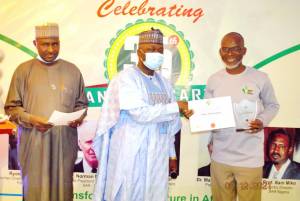
“Nigeria’ll keep partnering SAA for improved productivity” – Agric minister
In his speech, Nigeria’s agric minister, Dr Mohammad Abubakar, commended SAA’s services to Nigeria over the past three decades, particularly the capacity building for agricultural extension agents and assured the NGO of his ministry’s continued support and partnership toward the advancement of smallholder farmers across the agricultural value-chain in the country.
“SAA has worked in the frontline with extension agents to promote the use of improved agricultural technologies across the value chains of Maize, Wheat, Rice, Sorghum, Millet, among others. They have imparted skills and knowledge based on global best practices in the agricultural value-chain, irrespective of the challenges and difficulties they have to deal with in the agricultural sector in Nigeria,” said the minister whose speech at SAA’s 35th anniversary was read by his ministry’s permanent secretary, Dr Ernest Umakhihe.
Dr Abubakar reiterated the government of President Muhammadu Buhari’s full support for SAA, noting that SAA’s goal of fostering food security in the country was in line with that of the Federal Ministry of Agriculture and Rural Development (FMARD). “SAA has gone beyond crop production enhancement, it is into agro-processing, marketing and capacity building of smallholder farmers and also encouraging the participation of women farmers and youth groups in income generation activities through service provision and postharvest and agro processing.”
The highpoint of the anniversary celebration was the unveiling of SAA’s new logo by the permanent secretary of the agric ministry on behalf of the agric minister, which was followed by the presentation of awards of merit to SAA Nigeria’s outstanding partners i.e research institutes, universities, farmers’ groups, ADPs; outstanding staff of SAA Nigeria were also honoured with awards of merit.
Since commencing operations in Nigeria in 1992, SAA-Nigeria has successfully supported more than 1 million smallholder farmers across Nigeria’s 6 geopolitical regions. SAA’s enhanced crop production technologies have helped farmers across Nigeria achieve improved productivity across different crop value chains, namely wheat, maize, rice, cowpea, soybean, groundnut, millet, sorghum, sesame, and cassava.

